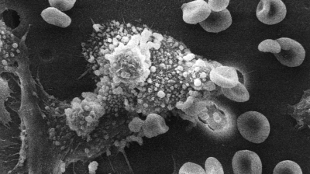 WIKIMEDIA, SUSAN ARNOLDThe District Attorney (DA) of Travis County, Texas, is investigating the Cancer Prevention and Research Institute of Texas (CPRIT) in Austin for possible criminal activity surrounding a recent round of grants it dished out, Nature reported. Concerns seem to revolve around awards given to companies owned by Dallas businessman David Shanahan, who was a major campaign contributor to both Texas governor Rick Perry and Lieutenant Governor David Dewhurst, “who control many of the levers when state dollars are handed out for economic development programs,” The Dallas Morning News reported. Though Shanahan claimed that his campaign contributions—$20,000 to Dewhurst and $15,000 to Perry since 2007—had “no impact of which I am aware” on the public dollars his companies received, his awards from CPRIT came despite receiving low scores from grant reviewers there, raising questions about the politics of CPRIT’s funding mechanism.
WIKIMEDIA, SUSAN ARNOLDThe District Attorney (DA) of Travis County, Texas, is investigating the Cancer Prevention and Research Institute of Texas (CPRIT) in Austin for possible criminal activity surrounding a recent round of grants it dished out, Nature reported. Concerns seem to revolve around awards given to companies owned by Dallas businessman David Shanahan, who was a major campaign contributor to both Texas governor Rick Perry and Lieutenant Governor David Dewhurst, “who control many of the levers when state dollars are handed out for economic development programs,” The Dallas Morning News reported. Though Shanahan claimed that his campaign contributions—$20,000 to Dewhurst and $15,000 to Perry since 2007—had “no impact of which I am aware” on the public dollars his companies received, his awards from CPRIT came despite receiving low scores from grant reviewers there, raising questions about the politics of CPRIT’s funding mechanism.
By awarding more money to Texas companies, as opposed to university researchers, “there is much more of a chance, using this mechanism, for favoritism to be given, and for politics to be inserted into the process,” J. Wade Harper, a Harvard Medical School professor, told The Dallas Morning News. Citing concerns over the integrity of its peer-review process, Harper recently resigned from CPRIT’s team of reviews—along with many of the rest of the 100 researchers that made up the agency’s expert roster, as well as its entire 8-member scientific review council. These resignations followed those of Nobel Laureate Alfred Gilman, who had served as CPRIT’s chief scientific officer, and another Nobel Prize-winner, Phillip Sharp of the Massachusetts Institute of Technology, former chair of the review ...














